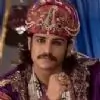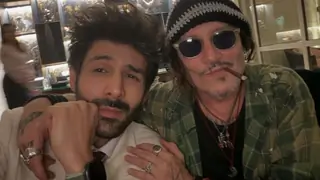Folks,
This time around, I propose to handle these 3 episodes, not chronologically, as I usually do, but in terms of half a dozen major scenes. This became necessary since several of these big scenes are divided between 2 episodes. In fact, the last part of the Jodha-Jalal-Rahim one spills over into Epsiode 69, but it has been covered here for the sake of continuity.
So here goes with my Take 6, in no particular order as regards quality!
1) The sudden demise of a glass vase :
This belongs in Episode 66, but going by the precap in Episode 65, I had aleady covered this segment in my Revelations post for that episode, under the telling sub-heading Unseemly behaviour. There is no point repeating any of that here, so I shall instead include some alternative lines that I had, in 2013, thought up for Jodha, this time as she is returning to her hoojra after the collapse of Rahim's testimony about the dibbi. Here goes!
"Returning to her khwabgah in a state of suppressed fury, Jodha Begum looks around in vain for something more to throw that would be reduced to a satisfactory heap of rubble. Baulked of this outlet for her bruised feelings, she is reduced to muttering dire imprecations under her breath:
Apne aap ko kya samajhte hain yeh Shahehshah? Ek to is Rahim ne sahi samay par mera saath chhod diya, aur main unke samaksha jhooti ban gayi. Aur to aur, unki Badiammi ne atyant chaturayi se mujhe apne shabdon ke chakravyuh mein uljha diya, jis se mein apne aap ko mukht hi nahin kar payi. Anth mein, mujhe Shahehshah ke krodh se bachane ka natak karke, unki drishti mein aur bhi vishwaspaatra ban gayi. Ab kya karoon mein?
Aaj to Kanha, aapne mere saath kitna dukhdaayi vyavahaar kiya hai! Kya apni itni mahaan bhakt ko aisi peedha dena aapko shobha deta hai ? (Kanha readjusts his earplugs and starts snoozing😉).
Ek to maine itni bahumoolya vastu todi, is ummeed mein ki tab to Shahenshah ko samjh aayegi ki hum par kya beeth rahi hai, aur hamein manane ka thoda to aur prayas karenge. Par unhon ne kya kiya? Mujhe ek aur dhamki deke chale gaye.
Ek shabd bhi nahin kaha ki : Jodha, hamse galti ho gayi, hamein kshama kar do. Agar thoda sa jhuk kar humse kshama mang hi lete, to kya bigad jata unki shahenshahwale guroor ka? Par inko to akadke rehne aur dhamki dene ke siva kucch bhi nahin aata!
Haan, par jootiyaan to dhyan se utaari thi is baar. Aur aarti bhi bina sankoch ke aur sahi dhang se le liya tha. Lete samay, humein dekh bhi rahe the; hum ne aankhon ke kone se dekh liya tha. Par jab humne unke aane ka kaaran poocha, yeh soch ke ki kuchch sahi kehne aaye hain, to wo dibbi aage kar di.
Bas jootiyaan utaarne ke liye unke itne sare avagunon ko hum kaise kshama kar dein? Kabhi nahin!!
And so on and on and on. Exactly like a Mills and Boon heroine 4 centuries down the years. Oh Jodha, my Jodha, when will you learn to read a man, even such an akdu Shahenshah, inside out, which is the first step to making him dance to your tune? "
A feeble excuse: To revert, what I could not understand, but had somehow failed to mention in my last post, was why Jalal came to Jodha with the dibbi at all. There was no way she could have known anything about it, for given its provenance, from that Agra dibbi maker, and the circumstances of the sale, the buyer was clearly a local and a Mughal. The only conclusion one can draw is that after having been summarily routed by Jodha in their last encounter, what he wanted was an excuse for turning up again in her hoojra!😉
What sambandh? : Similarly, the sambandh that the raging Jodha likens to the broken vase, jo ek baar tooth jaye to dobara banaya nahin ja sakta, puzzled me at first, seeing that all she claims to feel for him is itni ghrina. But then it dawned on me, as I had mentioned in an earlier section Mourning a loss, that just as Jalal raged against the loss of what he had believed Jodha to be, she too is mourning the loss of the budding empathy that she had felt after Jalal's praise of her poem and the special respect and regard he had showed her at the jashn. Of the prickly but real camaraderie that had put out a few tentative shoots after the duel and the aarti ki thali encounters. Of what might have been, but is now, as she believes, tunred to dust and ashes. There is really no other explanation possible.
A bond restored?: Finally, one of the things that I looked out for in vain in 2013 was an occasion when Jalal, after the aforesaid sambandh had not only recovered but was flourishing, would produce an identical glass vase, made by melting down and refashioning the broken pieces he had had conveyed to his rooms. Thus proving to Jodha that not only could broken glass and broken relationships be restored, but they could even be made stronger. It would have been such a charming scene, and then again, without it, there would have been no point in Jalal having the glassfragments collected and sent to him. But of course the CVs lost sight of it, as of much else, alas!
2) Jodha-Rahim & Jodha-Moti: Remarkable good sense:
Having chanced on a vital bit of evidence entirely serendipitously, Jodha handles Rahim, and the revelation itself, with a remarkable and unexpected degree of both good sense and pragmatism.
First, she soothes and calms down the frightened child, being careful not to give him any indication that anything was wrong or a cause for alarm. The way in which she hands Kanha's morpankh to Rahim, to reassure him, and then extracts the whole story from him, and in fact the whole of her gentle scene with the child were utterly charming. When she sends him out to play, having told him to forget about it and leave it all to her, I was applauding her grasp of child psychology.
I was even more impressed by what followed. For once trumping Moti in good sense, Jodha asserts that she cannot go to the Shahenshah with this revelation because (a) Rahim bachcha hai, aur kewal uske kehne par Maham Anga ko doshi nahin tehraya ja sakta, (b) Maham bahut kutil aur chatur hai, usne koyi suraag nahin chhoda hoga. Kewal us dibbi ke aadhaar par Maham Anga ko apradhi nahin siddh kiya ja sakta aur (c) Shahenshah is sultanat mein sabse adhik maan Maham Anga ka karte hain. Aise mein, yadi hum bina pakke sakshya ke unhein yeh baat batayenge, to unhein lagega ki hum pratishodh lena chahte hain. Could anyrhing be more logical or sensible than this?
She does utter a few predictable and angry phrases about never giving her kshama to either Maham, for the disgrace she had brought on to the Amer royals and on Amer itself, or the Shahenshah, for having destroyed her sister's chance of happiness because of his vivekheen nirnay. But by now one is so used to these fulminations that one hardly notices them!
There were 2 noteworthy omissions in this otherwise impeccable peroration.
- One, Jodha seems not at all bothered by the fact that Ratan Singh was a shelterer of dacoits who preyed on innocent people, and was in effect a dacoit at one remove himself, and thus hardly good husband material for Sukanya.
- Two, she never mentions the death of Jalal's baby as something for which she would not forgive Maham.
But from here on, the script goes badly awry. Was it that the mass walkout by 92 members of the Jodha Akbar team, including most of the writers, took place precisely at this point?
3) Jodha-Maham-Jalal: Colossal misjudgement:
Having made such an impressive start, Jodha then proceeded to muff her lines and muck things up, and in style.
Cardinal error: The cardinal rule in investigations where the evidence against the suspect has not yet been sewn up is NOT to let the suspect get the least whiff of his/her being under suspicion. For an alerted suspect will naturally move heaven and earth to fudge or destroy the evidence, and perhaps even get rid of the witness(es). All the more reason then, when the suspect is the redoubtable Maham Anga, as poisonous as a rattlesnake and as quick to strike from her position of power as the Wazir-e-Aaliya, the quintessential insider in Agra palace intrigues.
So what does apni Jodha do? She seems suddenly bitten by the show off bug, and summons Maham to the royal kitchens for what was obviously intended to be a cat and mouse game of veiled insinuations, culminating in a direct accusation against Maham. What was totally unclear in this exercise - where Paridhi did very well, with her large, limpid eyes reflecting the mood of each moment beautifully - was what it was supposed to achieve, other than giving advance warning to that purani khiladi Maham. For Jodha could hardly have expected her to fold up like an accordion and dissolve into a tearful confession!
At this point Jodha's script, whatever it was, predictably goes awry, for the wannabe mongoose is suddenly attacked by the rattlesnake. Maham Anga seizes the bit in her mouth, like a runaway horse, and hustles Jodha to meet the Shahenshah.
It does not seem that Jodha realises her mistake in precipitating matters, for she precedes Maham to Jalal's rooms with her head held high and with every appearance of confidence. So much so that when she hears Jodha's Humein isme koyi samasya nahin hai, even Maham is shaken for an instant, wondering what proof Jodha might have against her. She looks confounded and even afraid.
The Grand Accusation scene: Maham triomphatrix: But once in the presence of a preoccupied Shahenshah, when Jodha does not offer anything - neither an accusation nor evidence - Maham realises that Begum Jodha's cards are weak. She then seizes the initiative, and does her number on Jalal to such effect that the tables are turned against Jodha, at least for the present, as Jalal glares at her over Maham's head, while holding his Badiammi in a comforting embrace.
I do not intend to reproduce any of Maham's very many lines here. In any case, their impact was not from the lines themselves but from what Maham added to them, by way of a voice nearly suspended by tears, and her nautanki of a devoted khadim of the Mughal sultanate and Jalal's loving and self-sacrificing Badimmi.
Not just this. Maham cleverly manages, in her opening self-accusatory spiel, to reduce the charge from a capital one of murder to that of negligence by her in her capacity as the one responsible for checking all the gifts. Finally, she effectively cancels even this reduced charge by presenting herself as one who has been cruelly maligned by this Begum Jodha, clearly in revenge for Maham's having accused her earlier.
Maham has the advantage of having had a dry run for this kind of self-exculpatory lamentation with Adham the other day, but she outdoes herself this time. The woman's ability to weep crocodile tears so copiously at the drop of a hat never ceases to amaze me. She would have any day trumped the jazbaat ki malikas of Bollywood in the 1960s, Meena Kumari, Mala Sinha and Nutan, and left them in awe of her!
Jalal does not stand a chance under this deluge of high emotion from his Badiammi. Neither does Jodha.
The Grand Accusation scene- Conclusion:Maham thus runs rings round a bewildered Jodha, but the credit for this is not hers alone.
For Jalal, who has, while listening to his Badiammi present herself as the guilty one, run thru a whole gamut of emotions - incredulity, dismay, fear, and finally rejection: Nahin, aise nahin ho sakta! , - now goes into flashback mode.
He is addressing Jodha, beginning with the entirely predictable: Hum jaante hain ki aapne aisa kyon kiya. Kyonki humne aapko gunehgaar samjha, nazarqaid mein dala, isliye aap humein hamari hi nazaron mein girana chahti hain. Lekin tumhein begunah maan liya, itna hi kaafi hai. Ab gunehgaar ko dhoondhne ka kaam aap hum par chhod dein!
It should have ended there, relatively mildly. But triggered by Jodha's unfortunate response: Apradhi aap ke saamne lekar aaye aur aap... which produces a a stentorian roar BAS!!, Jalal tries to make Jodha understand what Maham is to him and why.
Out come, in one gushing torrent, all the long hidden terrors, the anguish and the loneliness of a little boy - Itne se the hum, itne se! - held hostage in Kabul and ever in fear of being murdered by his own chacha, by the sword or by being blown by a cannon. The total helplessness of his parents, and his total dependence, physical and emotional, on his Badiammi.
The words he uses as he reiterates his unshakeable loyalty to and love for her are incredibly moving, even as we are at one with Jodha in despairing about this unbreakable wall of his faith in a false god.
Above all when he says, in an unconscious reaching out to Jodha to seek her understanding : Tum jaanti ho, Jodha, ki hamare takht ke do pair hain. Ek hamare Khan Baba aur doosri hamari Badiammi. Aur Khan Baba ke inteqaal ke bad humne khud se vaada kiya ki chahe yeh duniya humein tabah kar de, lekin hum unhein tabah nahin hone denge jinse hum mohabbat karte hain! Pehle humne Khan Baba ko khoya, phri apni aulad ko khoya, par ab hum apni Badiammi ko nahin khoyenge!
And this is a man who is supposed to be heartless and immune to emotion? Of whom Jodha can, after watching him lay bare his heart and his innermost wounds, still say, back in her rooms, Dikhane ke liye krodh, dene ke liye dandh, aur lene ke liye pratishodh: yehi unki paribasha hai? How dumb and uncomprehending can this supposedly intelligent woman be?
A near escape: Jodha escapes a solid slap, or worse, from her enraged patidev for her gunaah-e-azeem, thanks to Maham's ostentatious intervention wih Jalal. This is followed up by some rather childish near winks and other facial distortions from Maham, for our benefit and Jodha's. It would have been far better if she had kept a straight face and kept up her pretense of innoncence even with Jodha, but then all criminals are finally undone by overweening vanity, and I am sure Maham will be no exception, especially after the resounding vote to confidence from the only person who counts - Jalal.
As for any outrage at what would be today seen as spousal abuse, even if Jalal had hit Jodha then for having done something which he considered beyond the pale, that would not, in that age, have made him an abusive husband. In fact, Jalal is not a wife beater. If he had been a Petruchio, he would have caught hold of Jodha long ago, laid her upside down across his knee, and given her a dozen of the best and juiciest with a stout jooti!😉
Curiously enough, the normally intrepid Jodha is plain scared as Jalal advances on her, and she flinches visibly!
So, by scene end, Jodha, as in the fable of the Three Little Pigs, can huff and puff all she wants to, but she cannot blow down Maham's house, anchored as it is in the bedrock of Jalal's unconditional love and trust for his Badiammi. She thus ends up, not where she started from, but a good ten steps behind, barely escaping another sazaa, not a jawaab, for this latest harkat of hers.
4) The Fallout:
There is a strange similarity in the way in which both Jodha and Jalal pace their rooms after this encounter. Both resemble nothing so much as caged tigers.
As for Jalal, this time he does not go to Ruqaiya for consulting her about the latest development.. He tells her about it only after she presses him, voicing his dismay at Jodha having made this accusation against his Badiammi, that too without offering any proof. He then leaves immediately, being deeply perturbed by the distress his Badiammi, as he imagines, must be feeling about this accusation.
While Ruqaiya, being shrewd and, more important, knowing Maham far too well, is left wondering how is it that the normally intelligent Jodha would have thought of accusing Maham, jin par Shahenshan awaaz bhi nahin uthate, and as to what is it that Jodha has learnt.
Vivekheen purush: Jodha, meanwhile, is raging along entirely predictable lines, but luckily for Kanha, to the long suffering Motibai, and not to Him! 😉
Apni Jodha can never be accused of a having any imagination, even less the ability to put herself in the other person's shoes and to try to think as he would. So it is not surprising that she had apparently has no inkling of how Jalal would react to her charge against Maham, and that too unsupported by any proof.
She actually expects him to believe an accusation, from a wife who displayed acute hostility towards him even half an hour earlier (when he came to her with that dibbi), that the mother-figure who has been the sheet anchor of his life, and to whom he has owed his very existence time and again, is guilty of extinguishing the life of his unborn child.
But what I found dismaying is that even post facto, what she has learnt from him now, about the horrors of his childhood, does not seem to have made any particular impression on her, nor led to any greater understanding of the scars that must have been left on his psyche, and of his desperate gratitude to those who stood by him then and protected him at all costs.
She seems, judging from the unchanged language and tenor of her complaints against Jalal, to have no comprehension of where he is coming from about these persons, of whom, now, he has only Maham left. I would have expected a woman of Jodha's supposed intelligence to see that Jalal's faith in and love for his Badiammi, however mistaken, are rooted in valid reasons, and cannot be dismissed by declaring Jalal to be kaan ka kachcha, deriding his andha vishwas (how would Jodha have reacted to any such accusation against Mynavati?) or by coining nifty paribhashas for him: Dikhane ke liye krodh, dene ke liye dandh, aur lene ke liye pratishodh!
When she says, angrily, Wo unhin ki sunte hain jinki wo sunna chahte hain!, I almost laughed out loud, thinking of how well Jodha listens to anything showing Jalal in a good light, even if it comes from Salima!
I do not know if Motibai has been briefed with the details of Jalal's horrible childhood. I think not, otherwise she would have had some good advice for Jodha. Bereft of such correctives, Jodha goes on ranting that even with the culprit in front of him, Jalal is still talking of finding the culprit.
Shubhchintak??: Then she adds something very curious. That Jalal does not realise that those close to him are there only because wo shaktishaali hain (I said to myself - Atta girl!) and worse, Kyon wo un logon ki nahin sunte jo unke shubhchintak hain? To wit, herself.
So it appears that Jodha has not only given up wanting Jalal's sar but, even with the abundance of ghrina that she claims to still have for him, she is a self-professed shubhchintak of Jalal's! Now this is something for the record books, though Jodha does not seem to have realized that she is contradicting herself blatantly.
The pity of it is that this momentous revelation is not known to Jalal, who, not surprisingly, is still operating from the premise that she wants to get back at him for the humilation she and her family has suffered, by mujhe apne hi nazaron me giraakar, ie by the accusation against his Badiammi.
To revert, Jodha has no plausible answer to Motibai's valid question as to why, if she hates Jalal so much, she keeps thinking about his loss and about him, and why she cannot leave the matter alone for him to handle. So Moti is, along with us, treated to the same old spiel about why Jodha is so angry with this vivekheen purush that she has had the misfortune to marry, and a reiteration of her determination to keep plugging away at her recalcitrant patidev still he is forced to believe in Maham's guilt.
Not for nothing do I always say that our Odd Couple are each exactly like the other above all in their bullheaded stubbornness!😉
5) Jodha-Jalal- Rahim : A grand fiasco!
By now, this has started bordering on comedy, rather like a Pat and Mike or Santa and Banta cross talk act😉😉.
Jodha turns up like the proverbial bad penny in Jalal's rooms, reinforced with a fresh determination: Is baar Shahenshah ke saamne sakhsya lekar jaayenge.
He goes into his predictable spiel about Aapko iski kadi sazaa milegi if she accuses Maham again, to which she responds by trotting out her humein dandh se koyi bhay nahin hain mantra, , and jo baat kehni hai wo kehte rahenge! Adding for good measure that he does not know anything but to hand out dandh to nyaay-seekers ( Jodha, apparently, does not believe even her BFF Salima about the release of the little Hindu boy's parents, as that would have spoiled her idee fixe about Jalal, nor has she, characteristically, checked up on it)
When Jalal warns that her good fortune in being saved twice (once by Ruqaiya and once by Maham) is unlikely to last, she comes back with another snappy one liner : Bhagya ki chinta kaayar karte hain, jo hum hain nahin. In his place, I would have retorted Kaayar to nahin, par aap dheeth zaroor hain!, but Jalal is not known for sharp repartee, alas!
Jodha's clear eyed retorts to Jalal's huffing and puffing are a delight to behold. By now, his threats affect her as little as the water that runs off a duck's back. When he is warning her about, if I am not mistaken, Jalal ka qahar, she looks at him with the detached interest of an entomologist looking at an unusual specimen thru a magnifying glass😉.
The sakshya that wasn't:So on to the promised sakshya ( I often wonder about how well Jalal/Jodha each understands what the other says, for their lingo is as far apart as can be. This must have been a contributory factor to their perennial mutual misunderstandings!), little Rahim.
Unfortunately, Rahim lands up just as Jalal is snarling at Jodha that in the Mughal regime, the guilty are not spared, even if they are relatives. The child is, unsurprisingly, petrified with fear, especially when Jalal asks him point blank whether he took the dibbi. He does not mean to frighten Rahim, whom he loves dearly, but the tone of his voice is a carry over from what he was barking at Jodha, and it must, unfortunately for Jodha, have dried up anything Rahim might have been intending to say.
He can only blurt out, his eyes huge in his tense little face: Maine nahin churayi! Hum chor nahin hain! Humein sazaa mat dena!
So, despite Jodha's coaxing, and later her leading questions to Rahim: Tumhein wo dibbi kahan se mili? Kaun tha wahan par? And the most ill-advised of all, Kaun us mein se dature ka ark daal raha tha? Bataayiye!, the whole exercise ends in a fiasco.
Jalal, unsurprisingly, snaps at Jodha: Use behakane ki koshish mat kijiye! Hum us se bat kar rahe hain nai?, before turning to Rahim: Kya tumne yeh dibbi li thi?
That does it. As Rahim simply reasserts the one point relevant for him: Humne nahin churayi! and adds for good measure: Hum Chotiammi se baat nahin karenge! Chotiammi buri hain!, before bolting from the scene, Jodha's discomfiture is complete.
Still unbowed: But I was impressed by Jodha's making a recover even after this comprehensive collapse of her hopes. She knows that she is in the right, and she will not let anything, not even such a major setback, stymie her.
So, she does not let either Jalal's sarcasm: To yeh tha aapka gawah?, or his accusations that she had put pressure on a 4 year old to get him to tell lies to implicate Maham Anga, that too about things like the dature ka ark of which the child would know nothing, get her down. Not even when her assertion, Sach to sach hota hai, Shahenshah, chahe use bade kahein ya koyi bachcha!, is capped by Jalal's clever quip: Sach to wo bachcha keh kar gaya, ki aap buri hain!Wo bhaga aapki makkari dekh kar, Jodha Begum!
Instead, she declares, with unimpaired self-confidence: Bhool to hamari hai, hum aise vyakti ko ujala dikhane ki koshish kar rahe hain jisne apni aankhon par andha vishwas ki patti baandh rakhi hai.
Then comes the punch line worthy of her Kanha himself : Sachchai jaan ne ke liye, apne saare sambhandhon aur moh ko swayam se door rakhna padta hai. Aur jab tak aap aise nahin karenge, aap kabhi bhi sachchai tak nahin pahunch paayenge!
Theory and practice!: It is another matter that Jodha - who routinely issues blank cheques to all her sage sambandhi ( I including Ratan Singh simply because he was to join her family!) , who keeps saying that the Ameris were accused akaaran, disregarding the whopping sakshya that the ark was in their kesar, and insists that they should be believed because her family is above suspicion- herself consistently disregards her own lofty maxim in practice!
Weary resignation: This was all mild, relatively speaking, for a Jodha-Jalal encounter, and contrary to one's entirely understandable expectations, the Agra palace roof was not shaken by any fresh explosion of Jalal ka qahar. Clearly, Jalal had decided to spare his vocal chords, and had also realized - der aaye durust aaye - that there was nothing to be done with this Amer ki mirchi but to disregard her buzzing around like a persistent mosquito.
We were then treated to the equally unfamiliar sight of Jalal wondering, once he had got rid of his persistent spouse: Pata nahin Jodha Begum Badiammi ke peeche kyon padi hui hain?, with the trademark puzzlement of the male of the species confronted with the inexplicable ways of women. There was a surprising degree of normalcy, so to speak, about that wry comment, very typical of a harried husband with a stubborn wife. Rage and frustration seemed to have given way to weary resignation!😉
6) Jalal-Bhamal & the farewell scene: Saving face:
Jalal does himself proud throughout this longish scene. Setting aside his cares of state - Minister Shamsuddin has a whole laundry list of problems for him about disaffection in various parts of the empire - Jalal still receives his father in law promptly and with respect.
In his scene with Bharmal, Jalal shows that he is that rara avis, an emperor who has the humility, the candour and the good sense to openly acknowledge his mistake, accept a reproof from his father-in-law, request him not to take it personally but as something due to reasons of state, actually seek his advice, and promise to take it in good part and not to repeat his mistake.
I cannot think of any other monarch as powerful as he is who would do even a fraction as much, capping it by going to see Bharmal off at the gates of Agra Fort. He does not let his imperial ego stand in the way of his desire to make amends for the wrong he has done, and that is both admirable in itself and very rare, both in his era or in any other.
Pompous pronouncements: Bharmal, worried about his family's reputation, goes into a spiel about choti and badi patthar ki lakeer, and his desire that Jalal should go down in history as a just king by repairing the injustice done to his innocent children by a greater act of justice. I could not make head or tail of what he was proposing, nor, I suspect, could Jalal. Nor, come to think of it, could Bharmal himself, though he was carrying on as if he was the direct descendant of Manu the Lawgiver himself. 😉
Jalal of course does not remind him of his folly in contracting an alliance for Sukanya with a bandit masquerading as a prince. Nor does he point out that while Jodha and her brothers might have turned out to be innocent in the end, the evidence against them was so strong that their being held under nazarband was not a whim but natural for so serious a crime.
Listening silently to Bharmal's vainglorious pronouncements that he could have taken out his sword and stood against Jalal - we all remember what happened the last time Amer stood against Sharifuddin😉, and also why Bharmal effectively forced Jodha into this marriage - Jalal does not permit himself even the smallest of knowing smiles. In his place, I would have smiled overtly, so incredibly foolish did it sound.
Instead, his eyes lowered half the time in overt awkwardness, Jalal nonetheless looks Bharmal full in the face, and without openly apologizing for his mistake (which an emperor cannot, any more than a government does these days when it eventually releases the wrong murder suspect) , he does everything just short of that.
Rajat is superb throughout this scene, with every fleeting nuance crossing his face reflecting the varying emotions he feels.
Incomprehensible humility: I was left puzzled as to why Jalal goes so far and bends so much to placate Bharmal. That he was in the wrong means nothing; powerful kings do not even acknowledge their mistakes, not to speak of showing their regret and their desire to make amends. They would see any of this as a sign of weakness, to be avoided at all costs.
Even when Bharmal says, when bidding farewell and in response to Jalal's (quite unnecessarily) wanting to extend the hospitality of Agra to him once again, that he hopes that Amer will always be able to stand with Agra, there is not even a flash of anger at such impertinence from the king of a tiny principality that Adham or Sharifuddin, given a free hand, could flatten in three days. Is it that Jalal is so weighed down by regret, or is it that he does not want his experiment with the Rajputs to fail prematurely?
Probably both, with the Jodha factor as a supplementary tadka, but even so, the depth of his evident desire to make amends was surprising.
All the more so when Bharmal too talks only of restoring the lost reputation of Amer and does not say a word about the tragic loss of the emperor's child. Plus, both he and his daughter seem to have a fancy for the word vivekheen, and Bharmal uses it to Jalal's face. No other emperor, or even a plain son in law, would have stood for it. Most would have reacted harshly, which would have been no more than Bharmal deserved.
This is India in the 16th century and the son in law is the most powerful ruler in the land, while the father in law is the ruler - by the grace of the son in law- of a small tin pot principality, basically because he wanted to marry the daughter. What would their equation be like, and this no matter WHAT the son in law had done?
Bending too far: The way they have shown Jalal behaving is highly unrealistic. Like governments these days, sons in law then NEVER said sorry for anything, never expressed regret, and the fathers in law were subdued and accommodating. That was the situation.
It was foolish of Jalal to give anyone so much bhav. Itna bhi kisi jo sar par nahin chadhana chahiye. No wonder Bharmal goes on an on preaching at him.
If Jalal had informed him, calmly but clearl: Look, the evidence against your children was such as to convince anyone. So I had to incarcerate them but even then I did not imprison them, and I personally conducted the investigation and exculpated them in the full court. You have to remember that this was a capital crime.
As for your prospective son in law, I am surprised that you chose such a thug for Sukanya, no matter what the problems. I will try and find an excellent husband for her very soon. Goodbye!, it would have been both fair and sensible.
It would also have been befitting the dignity and status on the Shahenshah-e-Hind. As I have said above, it is not at all credible for an emperor to bend so much, whatever wrong he might have done. Think of Louis XIV of France or Henry VIII of England or even his far less choleric daughter, Elizabeth I. None of them would have tolerated any such lecture from an outsider, which is what Bharmal is. He would have found himself, in short order, in the Bastille of the Tower of London.
Hamida-Bharmal jugalbandi: The prolonged love feast between Bharmal and the predictably gushing Hamida Banu during the farewell was enough to set even the most tolerant king's teeth on edge -especially when Bharmal talks of feeling at ease in Amer because Jodha has her as support in Agra. Any average son-in-law, especially a Rajput king, would have reacted sharply and said something cutting in reply. But not our Jalal.
Though he is clearly far from pleased, either with Bharmal or with his Ammijaan, and no wonder. His reaction showed his mounting exasperation at what is, given the circumstances, a veiled insult to himself. His adaab after that to Bharmal is very curt, and he leaves as soon as the latter has left, without even waiting for his Ammijaan.
It is probably the accumulated exasperation of these passages with Bharmal and Hamida that primes Jalal for a near explosion when Jodha and Maham Anga land on him, and Maham's operatic aria is played out with full force.
Questions & contradictions:
1)How is it that the CVs do not even seem to have noted the clear contradiction between the chortling now between Maham and Resham about the the earlier miscarriages of Jalal's other expectant begums, courtesy Resham, and Maham's earlier assertion, to the selfsame Resham, that she could never, whatever her hatred of Ruqaiya, have plotted to kill the child of her beta Jalal? The notes about that earlier episode had clearly been lost!
NB: Maham is now plain awful, and as the only reason for her having bumped off all the earlier babies can be that she does not want Jalal to have an heir, I am forced to believe what I could never believe of an intelligent woman like Maham: that she can be demented enough to think that Adham can somehow be made the emperor.This makes me think even worse of her; a clever villain is one thing, no matter how depraved, but an unbelievably stupid one is insufferable.
In this context, it is good that the Rahim factor has been brought out into the open, for if Maham had cottoned on to him earlier, she would surely have dis posed of him and made it look like an accident, perhaps by drowning him in one of those water bodies.
But all said and done, I think Maham's resentment has to do more with her being, when the chips are down, only a daayima, not a begum, not to having had to neglect Adham to care for Jalal.. Which is why she is so rude and overbearing to the daasis, and very bigoted towards the Hindu ones. The latter is because she resents having been a hunted refugee in Rajput palaces, in Umarkot and in Madhya Pradesh.
2) During their family consultations, when Bhagwan Das is persuading Bharmal to leave for Amer, Mansingh, while praising his buasa, notes that Shahenshah ne na jaane kitni baar unpar krodh kiya, lekin unhon ne uska datkar saamna kiya. Wo dari nahin. How does he know that? Jalal's threats to Jodha were all delivered in private.
3) Jalal to Ruqaiya: Hamare pas dil to hai nahin, lekin unhon ne (Jodha ne) us par nishana lagaya hai jo hamare dil ke sab se kareeb hain. (?!?)
Ok, folks, this is it for now. Bye till Sunday next!
Shyamala/Aunty/Akka/Di





































372